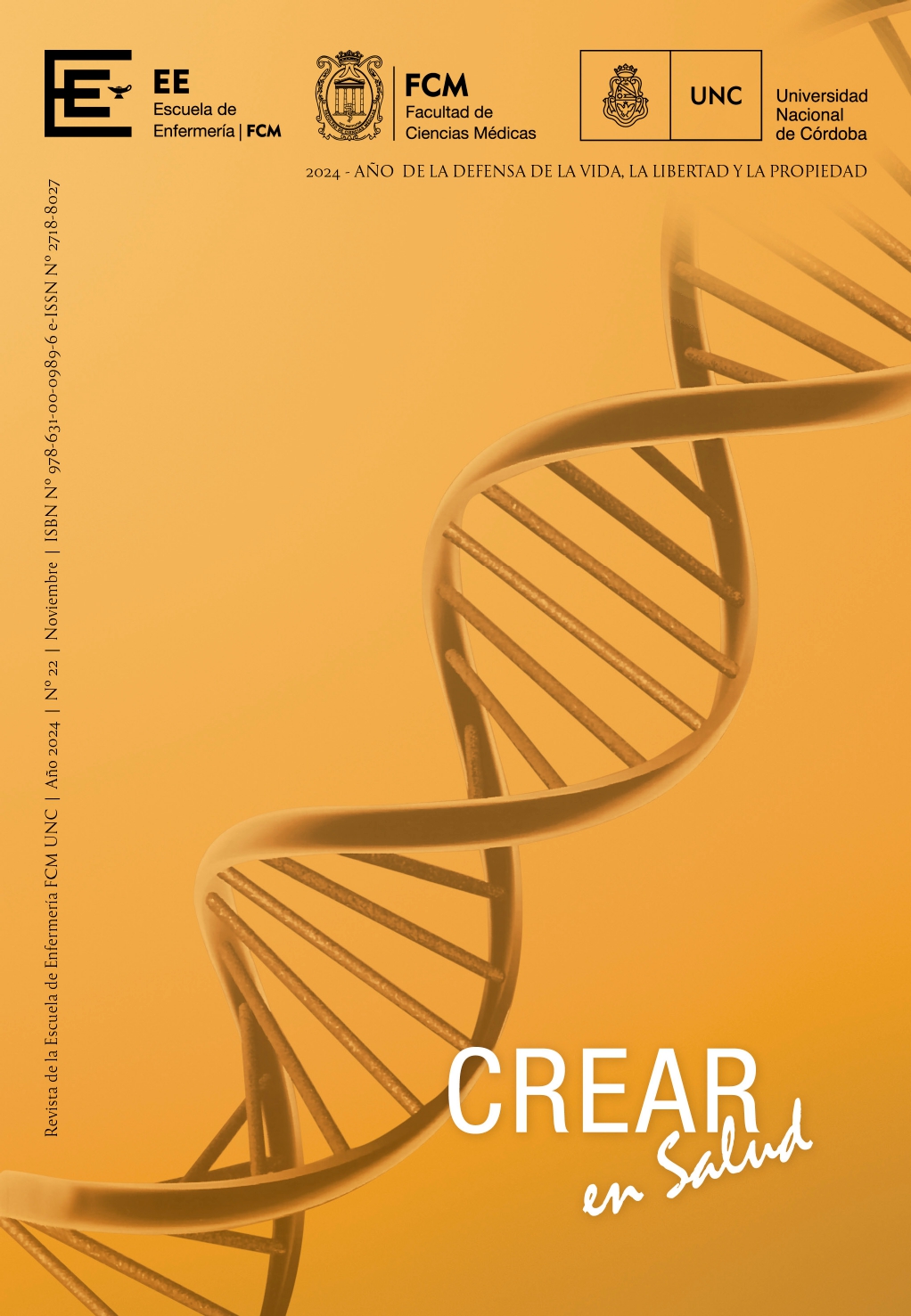Parental experiences in dealing with perinatal bereavement
Keywords:
Perinatal death; perinatal bereavement; perinatal period; grief; nurse; care; experiences.Abstract
Introduction: When a pregnancy is expected, along with the beginning of a new life, expectations and hopes arise, and no one imagines an ending other than a happy one. However, sometimes pregnancies do not end satisfactorily and can result in the sudden and unexpected death of the child during the perinatal period. Objective: To understand the experiences of parents when confronted with the process of perinatal death. Material and method: A qualitative methodology was used. Data collection method: Interviews with parents who have experienced a perinatal or neonatal death between 22 weeks of gestation and 28 days of life, in hospitals and clinics in the city. The data was gathered using primary information sources. Data analysis was based on phenomenological theory, utilizing experience sampling and theoretical frameworks until data saturation was reached. Results: The findings were determined based on the specific objectives of the research and organized into two major dimensions, each of which was subdivided into subcategories derived from the narratives, accounts, and observations. The dimensions are as follows: experiences and emotions during the grieving process. First category: the joy and excitement of becoming parents; second category: fear and uncertainty as the feeling of loss sets in; third category: loneliness and sadness during grief. Second dimension: Experiences regarding the care received from healthcare professionals during grief; first category: Conflicting feelings regarding the care provided by the healthcare team. Conclusions: It can be concluded that the main feelings expressed were guilt, sadness, emptiness, loneliness, desolation, and an incomparable, devastating pain, as reported by the parents. The death of the baby triggered an emotional outburst characterized by shock, pain, and an intensification of the feeling of loneliness. Regarding the care provided by healthcare professionals, most of the interviewees felt emotionally supported, although only during that moment.
References
Aimar, A (2009) El cuidado de la incertidumbre en la vida cotidiana de las personas. Revista, Index Enfermería, (18)2. https://scielo.isciii.es/scielo. php?script=sci_arttext&pid=S1132-12962009000200009
Asociación Americana de psiquiatría. (2014). Manual de Diagnostico de los trastornos mentales. DSM5R. https://www.cppm.org.ar/wp-content/ uploads/2015/06/DSMIV.pdf
Bustos Valdés, V. (2013) El Duelo. [Tesis para obtener la Acreditación del Di- plomado en Tanatología. Universidad Veracruzana]. https://www.tanato- logia-amtac.com/descargas/tesinas/216%20duelo.pdf
Campos Rodríguez, R. A, et al. (2016). Relación terapéutica enfermera – pa- ciente. Instituto Nacional de Salud Materno Perinatal. https://alicia.con- cytec.gob.pe/vufind/Record/RPCH_0bfe76eaa88640f0b78b55e0d0ff5 ef5/Description#tabnav
Figueroa, M. et al. (2020) Duelo: Manual de Capacitación para Acompañamien- to y Abordaje de Duelo. https://www.unicef.org/elsalvador/media/3191/ file/Manual%20sobre%20Duelo.pdf
Galvis López, M. (2015). Teorías y Modelos de Enfermería Usados en la En- fermería Psiquiátrica. Revista, Cuidarte, (6)2, 1108-1120. https://www. redalyc.org/pdf/3595/359540742012.pdf
Guzmán Gómez C., Saucedo Ramos C.L. (2015). Experiencias, Vivencias y Sentidos en torno a la Escuela y a los Estudios. Revista Mexicana de Investigación Educativa, (20)67,1019-1054. https://www.redalyc.org/ pdf/140/14042022002.pdf
Martínez Osta, N. (2012) El duelo desautorizado: muerte perinatal Pechos llenos, brazos vacíos. https://www.cop.es/uploads/PDF/DUELO-DESAU- TORIZADO-MUERTE-PERINATAL.pdf
Ministerio de Salud de Argentina. Secretaría de Acceso a la Salud. Subsecretaría de Medicamentos e Información Estratégica. Dirección Nacional de Epidemiología e Información Estratégica. Dirección de Estadísticas e Información en Salud. Boletín N°163 (2021). Natalidad y mortalidad infantil 2019. https://www.argentina.gob.ar/sites/default/files/boletinnro163.pdf
Ministerio de Salud de Argentina. Secretaría de Acceso a la Salud. Subsecretaría de Medicamentos e Información Estratégica. Dirección Nacional de Epidemiologia e Información Estratégica. Dirección de Estadísticas e Información en Salud (2020). Estadísticas vitales. Información. https:// www.argentina.gob.ar/sites/default/files/serie5numero64_web.pdf
Moneta, M. (2014) Apego y pérdida: redescubriendo a John Bowlby. Revis- ta Chilena de Pediatría, (85)3, 265-268. https://www.scielo.cl/pdf/rcp/ v85n3/art01.pdf
Moyano, I. (2019) Volvernos padres. Propuestas para Organizar Nuestra Vida Durante el Puerperio. Editorial Atlántida.
Lacasta Reverte, M. A. (2016). La atención al duelo en Cuidados Paliativos. Análisis de los servicios prestados en España. Revista Medicina Paliativa, (23)4, 192-198. https://www.medicinapaliativa.es/Documentos/Arti- culosNew/S1134248X14001037.pdf
López García de Madinabeitia, A. P. (2011) Duelo perinatal: un secreto dentro de un misterio. Revista de la Asociación Española de Neuropsiquiatría, (31)1, 53-70. https://scielo.isciii.es/pdf/neuropsiq/v31n1/05.pdf
Organización Mundial de la Salud (2022). Clasificación Internacional de Enfermedades. Undécima Revisión (CIE-11). https://www.minsalud.gov. co/sites/rid/Lists/BibliotecaDigital/RIDE/INEC/INTOR/cie-11-guia-re- ferencia-revision-11-feb2023.pdf
Pérez, M. B. s/f. Guía para familiares en duelo. https://www.bdv.cat/sites/de- fault/files/common/Salut/guia_per_a_familiars_en_dol.pdf
Lawrence, R. A (2021). Breastfeeding: A Guide for the Medical Professional. Elsevier Health Sciences.
Sociedad Española de Cuidados Paliativos. (2014). Atención al Duelo en Cui- dados Paliativos: Guía Clínica y Protocolo de Actuación. https://www.re- dpal.es/wp-content/uploads/2018/12/MONOGRAFIA-duelo-.-secpal.pdf
Prado, M. L. D., Souza, M. D. L. D., Monticelli, M., Cometto, M. C., & Gómez, P. F. (2013). Investigación cualitativa en enfermería. Metodología y didáctica. Serie PALTEX Salud y Sociedad 2000; 10.
Pastor Montero, S. M. (2016). Abordaje de la pérdida perinatal. Un enfoque desde la Investigación Acción Participativa. [Tesis para obtener el grado de Doctora en Ciencias de la Salud. Universidad de Alicante, Alicante, España]. http://hdl.handle.net/10045/54551 file:///C:/Users/Raquel/Downloads/tesis_pastor_montero.pdf
Sebastiani, M. (2005). Acerca del estado de embarazo: ¿Dulce espera? Revista, Encrucijadas (33). https://repositoriouba.sisbi.uba.ar/gsdl/collect/encru- ci/index/assoc/HWA_541.dir/541.PDF
Vicente Sáez, N. (2014) Duelo Perinatal: El Duelo Olvidado. [Tesis para obtener el grado en Trabajo Social. Universidad de Salamanca]. https://gre- dos.usal.es/bitstream/handle/10366/128540/TG_VicenteSaez_Duelo.pd f;jsessionid=F98771F562C790BB7A60A0DAEB7CF7E0?sequence=1
Downloads
Published
Issue
Section
License
Copyright (c) 2024 Crear en Salud

This work is licensed under a Creative Commons Attribution-NonCommercial 4.0 International License.



